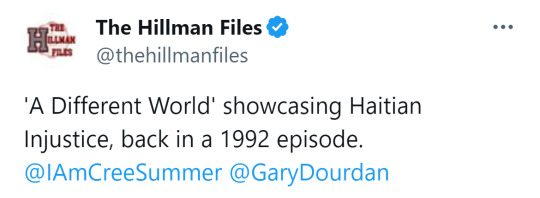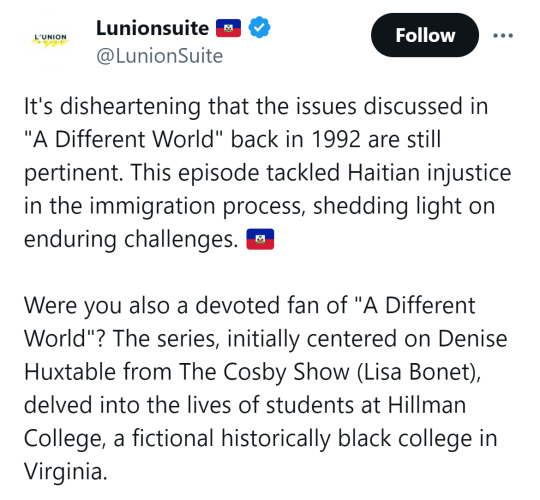#history of haiti
Text

"Daut brings alive Haiti's fascinating intellectual history and shows brilliantly how Haitian thinkers shaped the culture and politics of their own country even as they transformed broader understandings of race, revolution, and the writing of history. This powerful and necessary book challenges us to think differently about the global history of thought."
23 notes
·
View notes
Text




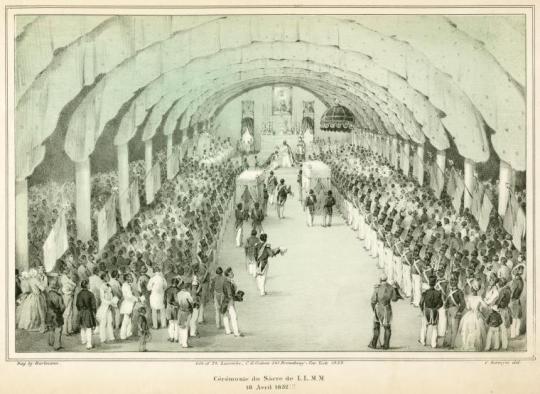
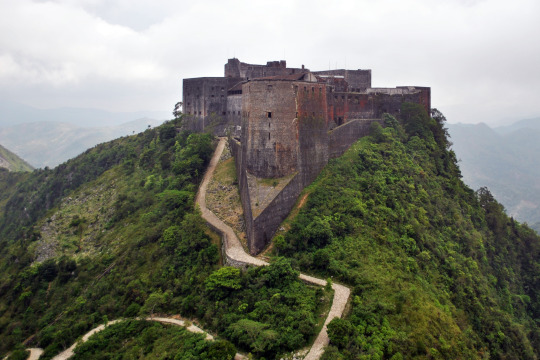
History of Haiti
The recorded history of Haiti began on 5 December 1492, when the European navigator Christopher Columbus landed on a large island in the region of the western Atlantic Ocean that later came to be known as the Caribbean. It was inhabited by the Taíno and Arawakan people, who variously called their island Ayiti, Bohio, and Kiskeya (Quisqueya). Columbus promptly claimed the island for the Spanish Crown, naming it La Isla Española ("the Spanish Island"), later Latinized to Hispaniola.
https://en.wikipedia.org/wiki/History_of_Haiti
Part of a series on the
History of Haiti 📷 Pre-Columbian Haiti (before 1492) Captaincy General of Santo Domingo (1492–1625) Saint-Domingue (1625–1804)
Haitian Revolution
First Empire of Haiti (1804–1806)
1804 Haiti massacre
Siege of Santo Domingo
North Haiti (1806–1820)
State of Haiti
Kingdom of Haiti
South Haiti (1806–1820)
First Republic of Haiti
Republic of Haiti (1820–1849)
Unification of Hispaniola
Second Empire of Haiti (1849–1859)
Haitian-Dominican Wars
Republic of Haiti (1859–1957)
United States occupation of Haiti
Duvalier dynasty (1957–1986) Anti-Duvalier protest movement Republic of Haiti (1986–present)
1991 Haitian coup d'état
Operation Uphold Democracy
2004 Haitian coup d'état
2010 Haiti earthquake
United Nations Stabilisation Mission in Haiti
Assassination of Jovenel Moïse
2021 Haiti earthquake
TimelineTopics
Military history
List of revolutions and coups d'état
8 notes
·
View notes
Text
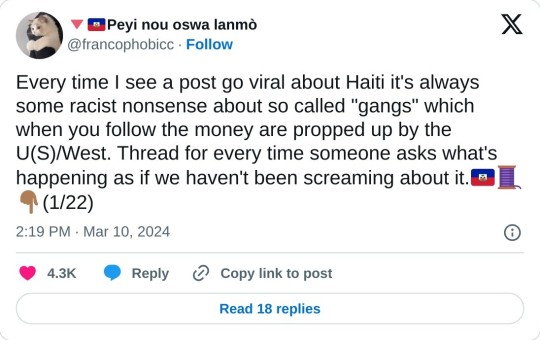
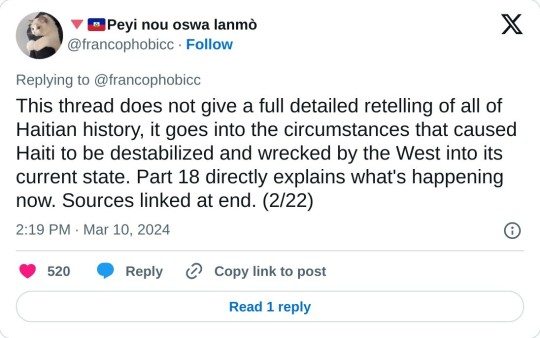
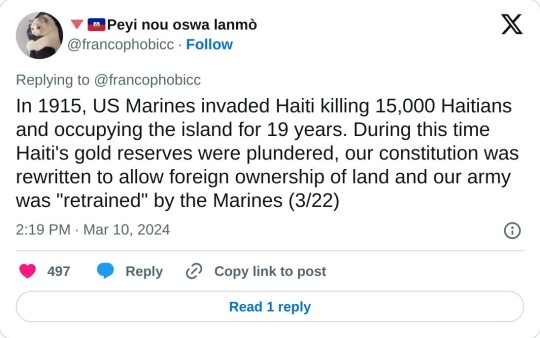
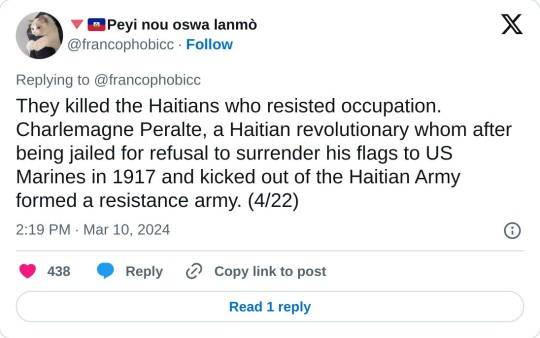
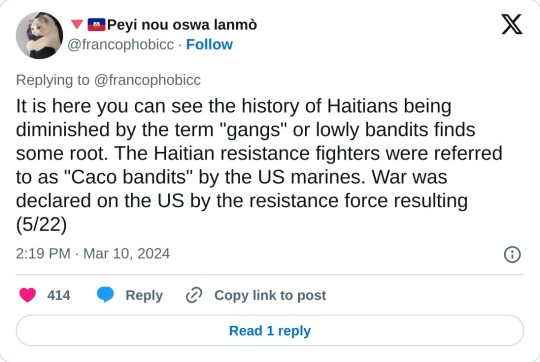
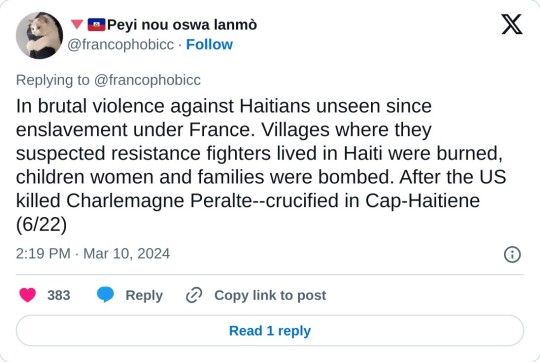

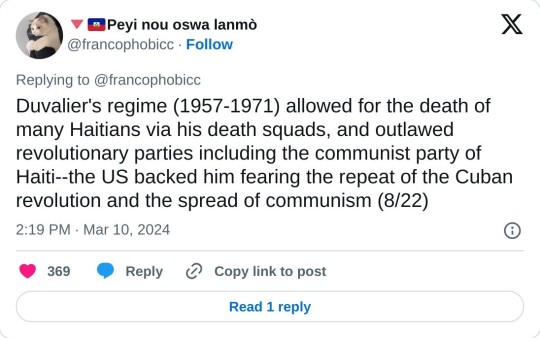



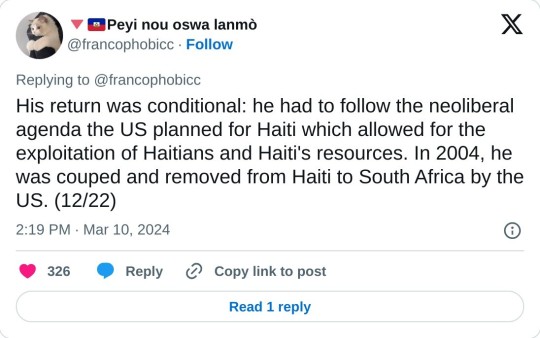
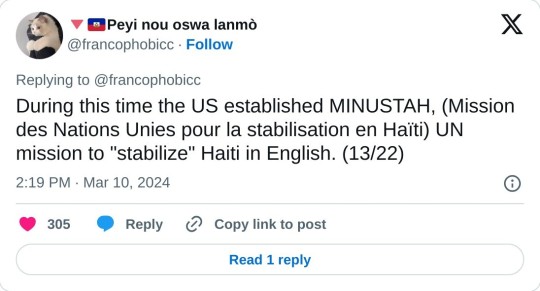

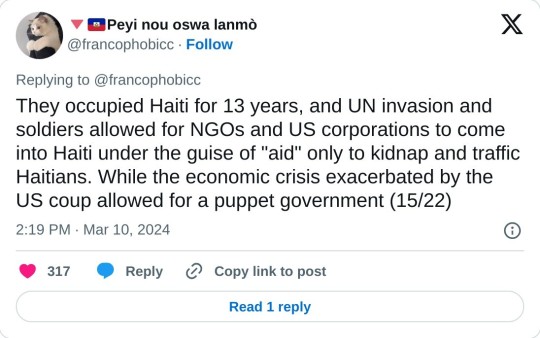

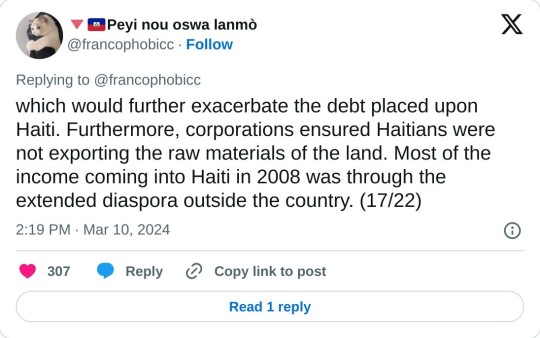
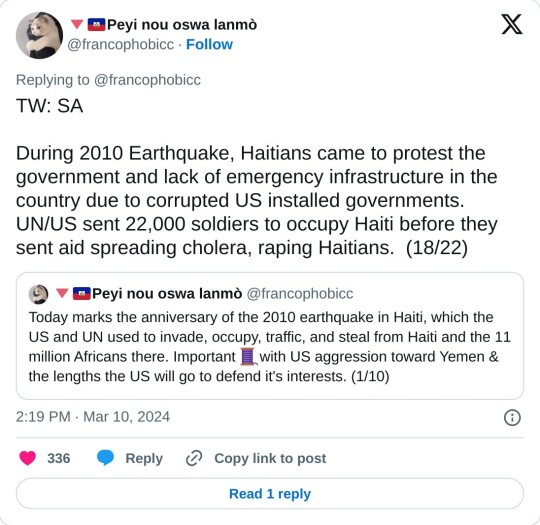


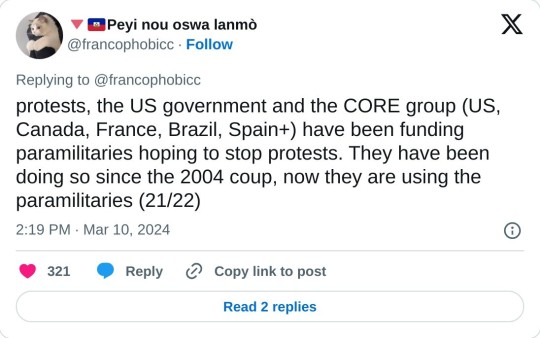
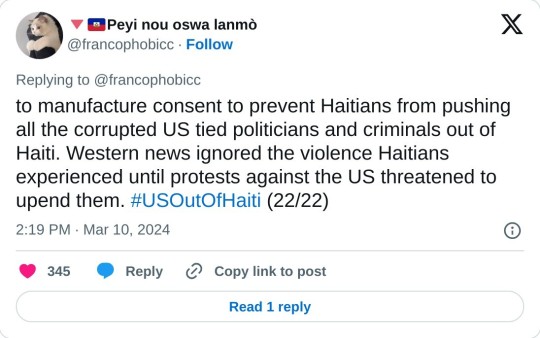
Resources OP provides:
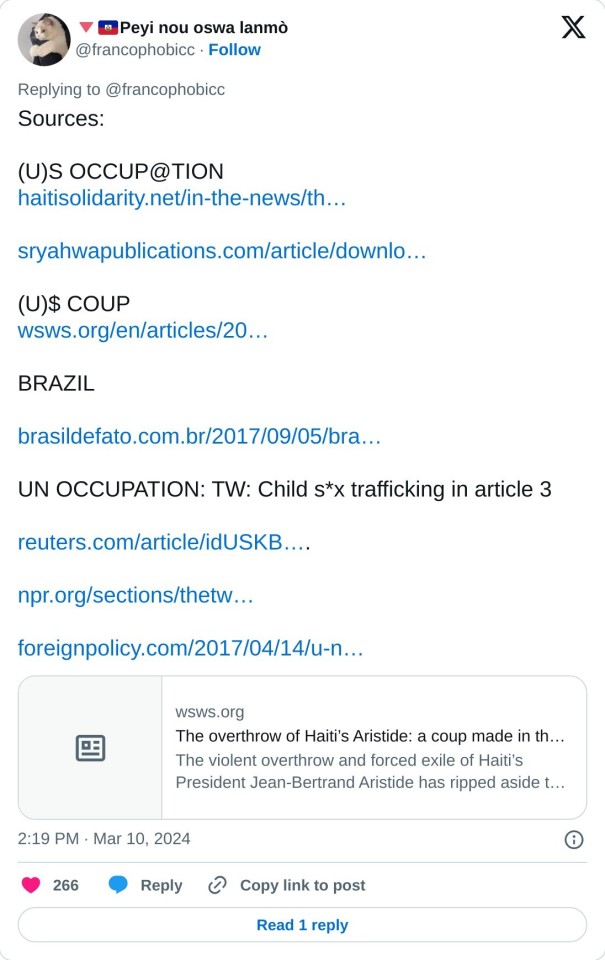
#feminist#social justice#current events#free haiti#haiti#haitian revolution#united states#france#brazil#history#united nations#us imperialism#western imperialism#us politics#us foreign policy#tw sa mention#USOutOfHaiti#us history#education
942 notes
·
View notes
Text
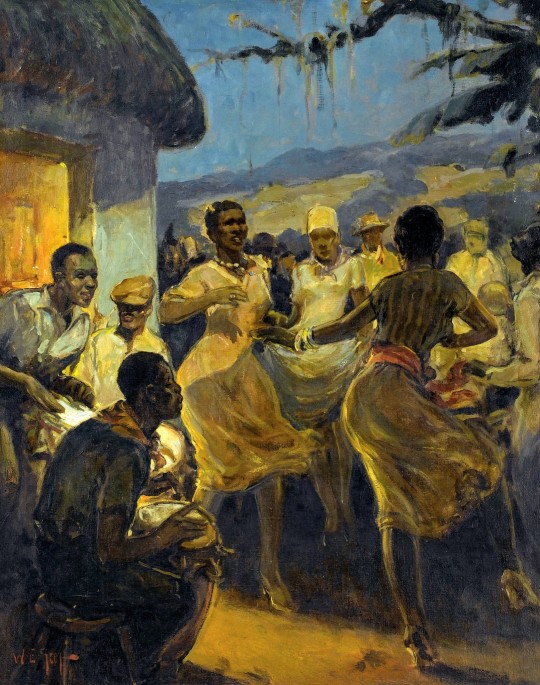
Full Moon, Haitian Rhythm (1931, oil on canvas, 30×24 in.) by African-American artist, William Edouard Scott.
#black art#culture#haiti#dancing#caribbean#art history#life#art#music#dance#black excellence#oil painting#black history#1930s#tropical#lifestyle#black culture#community#william edouard scott#painting#🎨
9K notes
·
View notes
Text
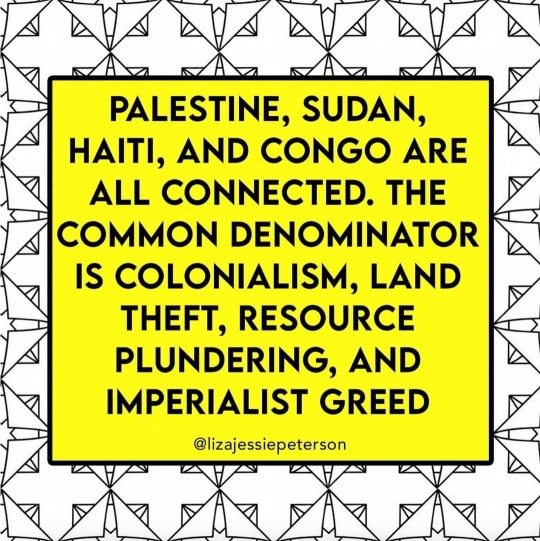
#free palestine#free sudan#free haiti#free congo#blacktumblr#black history#black liberation#african history
444 notes
·
View notes
Text
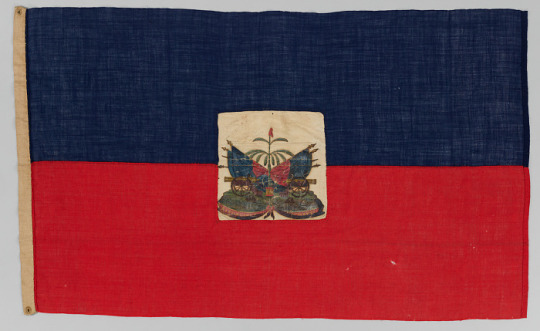
Flag of the First Republic of Haiti, early 1800s.
420 notes
·
View notes
Text
A symbol of resistance
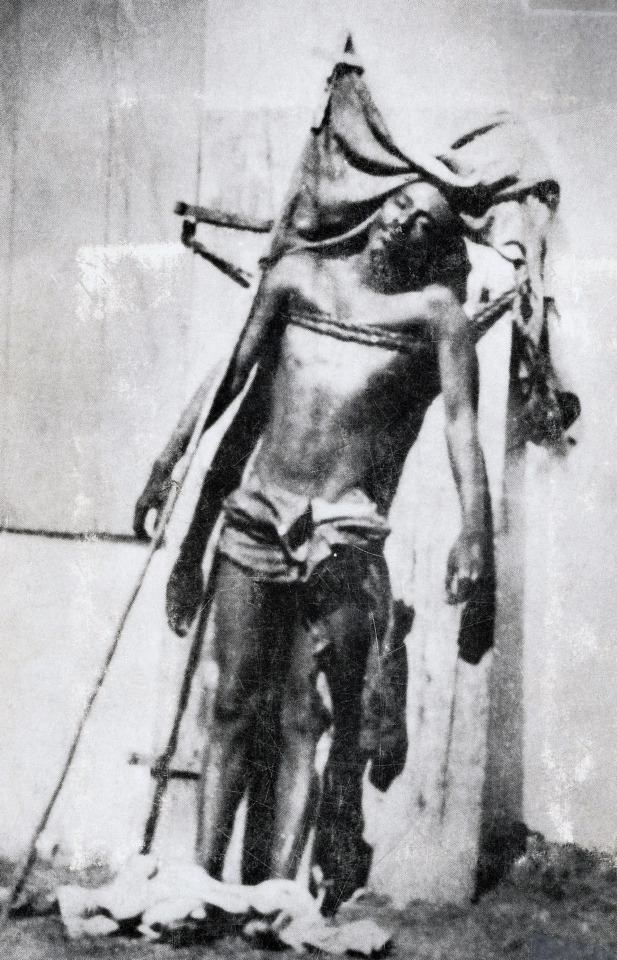
Charlemagne Péralte
Charlemagne Péralte was a Haitian resistance leader shot by U.S. forces during the 1915 occupation.
After Péralte's death, U.S. troops displayed his body posed in a way that resembled a crucifixion – tied upright with a Haitian flag draped over him. This photo was intended to intimidate the Haitian population.
However, it backfired. The image resonated with Haitians, making Péralte a martyr and a symbol of resistance. There's even a famous Haitian painting called "The Crucifixion of Charlemagne Péralte for Freedom."
#resistance#Charlemagne Peralte#Ayiti#Hayti#Haiti#U.S. Occupation#martyr#Hero#The Crucifixion of Charlemagne Peralte#african diaspora#History#EvilisWinning#black liberation#1915
296 notes
·
View notes
Text
The Haitian Revolution
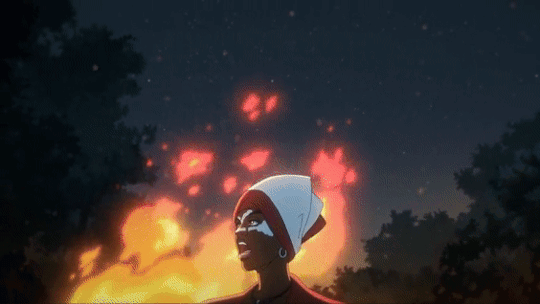
Yeah, okay. I guess to properly do the history thing, I also have to talk about the Haitian Revolution, don't I? Given that it is so important for the backstory of both Annette and Edouard.
Why didn't I do that so far? Because the Haitian Revolution is super hard to talk about because of the sources. A bit issue is that for a good part of it we only have French sources, that are not always the most... neutral. Because a lot of the rebelling slaves had never learned to write. As such, we actually do not know a lot about the side of the rebels until some Free Blacks started to take their side and lead the rebellion.
But I know a bit.
So, let me explain what I know.
Haiti (St. Domingue specifically, the French side of the island) was build exclusively on slave work. There were plantation there for indigo, sugar and coffee for the most part. And those plantation were very important for the French economy. And of course it was slaves working those plantations.
On the island there was a three class system (though if we are honest, it was a four class system).
Whites, who were free people and citizens of France. (Though in truth there was a difference between the plantation owning whites and those whites, who were not of the owning class.)
Free Black people. What differed in Haiti from the US for example is that it happened quite often that children of rape (white owners on Black slaves) would be freed and even adopted as children. While not considered citizens, they could own things, including their own plantations. (Yes, there were quite a few of these that owned slaves.)
Slaves, who outnumbered all other people on the island somewhere between seven to one and ten to one.
Now, most slaves did not survive the first three years after getting to the island. Many died in fact in their first year, because the working conditions were so harsh, they often did not receive food, were severely punished (through it receiving infections and such), and of course there was just the general issue of sicknesses.
There were people rebelling a long while and from what we know (again, there is so little in terms of sources) there were some escaped slaves living in the mountains and at times using guirella tactics. But there was not quite the move for a widespread rebellion starting...
That was until the French Revolution started. Once more the gentle reminder: The French Revolution took a long while to brew and originally was not a violent revolution, it only became violent in response to the violent oppression of it. Now, the people on St. Domingue were instructed not to talk about the Revolution, because some folks rightly assumed that it might give people ideas. Especially as among the Revolutionaries there was a big discussion about the abolition of slavery.
But in the end... Well, it did not work out and the freed slaves banded together for a proper uprising in 1791.
It is this uprising that we see in Nocturne. I have seen some people being very shocked in the human on human violence we see there, because folks are really whimpy when it comes to that. So, a little explanation: Originally (in the 1791) uprising the slave uprising was once again not very violent. Almost everyone who got killed was connected to immense abuses of slaves. The rebels tried to spare everyone who treated their slaves kindly. As such within that first uprising only 400 whites got killed, compared to 4000 Black people, as the French were much better armed.
Still, the rebels managed to capture part of the island.
It should be noted: This is probably around the time when Annette and Edouard left. They captured some plantation, and freed quite a few more slaves.
There would follow quite a bit of back and forth then. Especially between Haiti and the French Republic. And I would not be surprised if we were to see that in the coming season(s).
Mostly, because the Revolitionaries went back and forth between whether Free Black people could be citizens who got to vote or not. Making the Free Blacks, who originally were against the revolution, more and more take the side of the rebels.
And yes, it would get more and more violent. Because France and then later Britain, too (who did not agree with France on many things - but on saving slavery) threw thousands upon thousand of soldiers in fighting down the revolution with extreme violence, leading the Haitian Revolutionaries to answer this violence with their own violence.
But for the love of God, do not go there and be like: "Ugh, violence. Violence bad." Like, fuck that. I said that about Isaac before as well: Slaves freeing themselves have the right to use whatever violence necessary for that.
#castlevania#castlevania netflix#castlevania nocturne#haiti revolution#haiti#colonial history#slavery#castlevania annette#castlevania edouard
370 notes
·
View notes
Text

Today In History
Jean Jacques Dessalines was a leader of the Haitian Revolution and the first ruler of an independent Haiti under the 1801 constitution. Jean Jacques Dessalines proclaimed the independence of Haiti on this date January 1, 1804.
Dessalines was brought to the French West Indian colony of Saint-Domingue (Haiti) as a slave. He worked as a field hand for a black master until 1791, when he joined the slave rebellion that broke out in the colony amid the turmoil caused by the French Revolution. In the decade that followed, he distinguished himself as a lieutenant of the black leader Toussaint Louverture, who established himself as governor-general of Saint-Domingue with nominal allegiance to Revolutionary France.
When Toussaint was deposed in 1802 by a French expedition sent by Napoleon Bonaparte to reconquer the colony, Dessalines at first submitted to the new regime. In 1803, however, when Napoleon declared his intention to reintroduce slavery (which had been abolished by the French National Convention in 1794), Dessalines and other black and mulatto (of mixed European and African descent) leaders rose in rebellion.
CARTER™ Magazine
#carter magazine#historyandhiphop365#carter#wherehistoryandhiphopmeet#history#cartermagazine#today in history#staywoke#blackhistory#blackhistorymonth#Jean Jacques Dessalines#haiti
197 notes
·
View notes
Text
Obama, Clinton & Bush speaking about Haiti disaster relief, right before they stole all of it.
Bush: "The most effective way for Americans to help the people of Haiti, is to send money. That money will go to organizations on that ground who will be able to effectively spend it." "I know a lot of people wanna send blankets or water, just send your cash. One of the things the President and I will do, is make sure your money is spent wisely."
And then, they stole it.
Crooks. All of [Them]
How do you feel about hearing this in today's time, especially given what you know about Haiti's missing children, missing money, the Clinton Foundation & the Clinton's VERY close relationship with Jeffrey Epstein and Ghislaine Maxwell? 🤔
#pay attention#educate yourselves#educate yourself#knowledge is power#reeducate yourself#reeducate yourselves#think about it#think for yourselves#think for yourself#do your homework#do some research#do your own research#ask yourself questions#question everything#news#history lesson#american history#lies exposed#crooks#government corruption#nothing but thieves#liars#haiti#hidden history
132 notes
·
View notes
Text

“This book presents a brilliant analysis of the neoliberal policies imposed on Haiti by international institutions. Dupuy skillfully connects decades of extractive foreign interventions in Haiti, from the US occupation to the aftermath of Jovenel Moïse’s assassination. Haiti since 1804 points the way toward a future in which Haitians might finally regain sovereignty over their own economy and government."
17 notes
·
View notes
Text

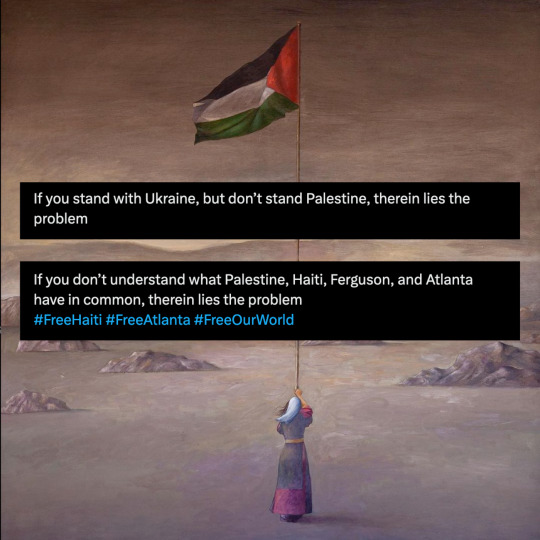

Revolution is not a romantic sentiment. Revolution is not an intellectual thot exercise (yes that kinda thot). Revolution is not the root, but the result of mass suffering and death that is met with silence and non-action.
Revolution is a dream and nightmare that refuses to die quietly.
The ancestors are watching from Guatemala and Gaza to Atlanta and Haiti 🖤✨️🌿
The ah-mazing artist-activists and storytellers painting freedom into the frame:
🇵🇸 We shall return, Imad Abu Shtayyah (2014)
🌻 1811 Slave Rebellion, Lorraine Gendron and the St. Charles Parish Virtual Museum
🇵🇸 My name is Palestine and I will survive, Sliman Mansour (2016)
#our world#padawan historian#free palestine#free haiti#solidarity with palestine against apartheid#flowers and freedom for palestine#free us all#the march continues#black lives matter#our history is your history#israel is an apartheid state#Sliman Mansour#Imad Abu Shtayyah
208 notes
·
View notes
Text

In tankie clownland, Ukraine is totally responsible for western imperialism, colonialism and the trans-Atlantic slave trade (and this hurts tankie fee fees while they're simping for their favourite mass murderers)….
#tankie clownland#tankie#clown#useful idiot#ignorance is strength#haiti#ukraine#hammer and sickle#sierp i młot#communism#history#bad history take#twitter#x
81 notes
·
View notes
Text

Port-au-Prince, Haiti (1931, oil on canvas, 22 × 18 inches) by African- American artist William Edouard Scott.
#art history#black excellence#haiti#caribbean#culture#history#art#black history#oil painting#1930s#tropical#black tumblr#lifestyle#society#community#painting#black art#william edouard scott#blm#life#🎨
1K notes
·
View notes
Text
Heres a video explaining how the Polish helped the Haitians gain their independence
instagram
101 notes
·
View notes
